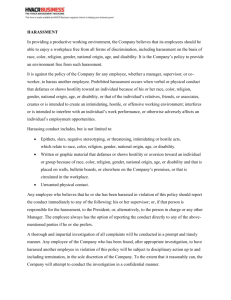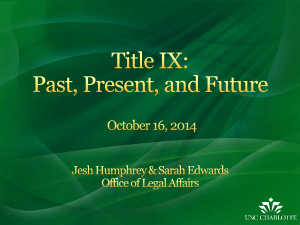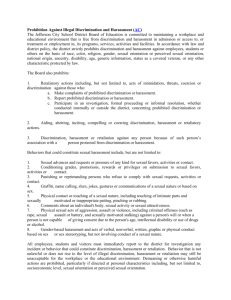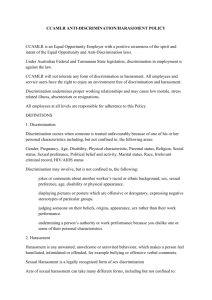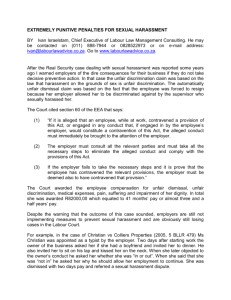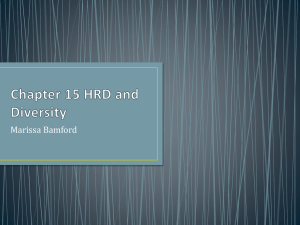discrimination and harassment - Raritan Valley Community College
advertisement
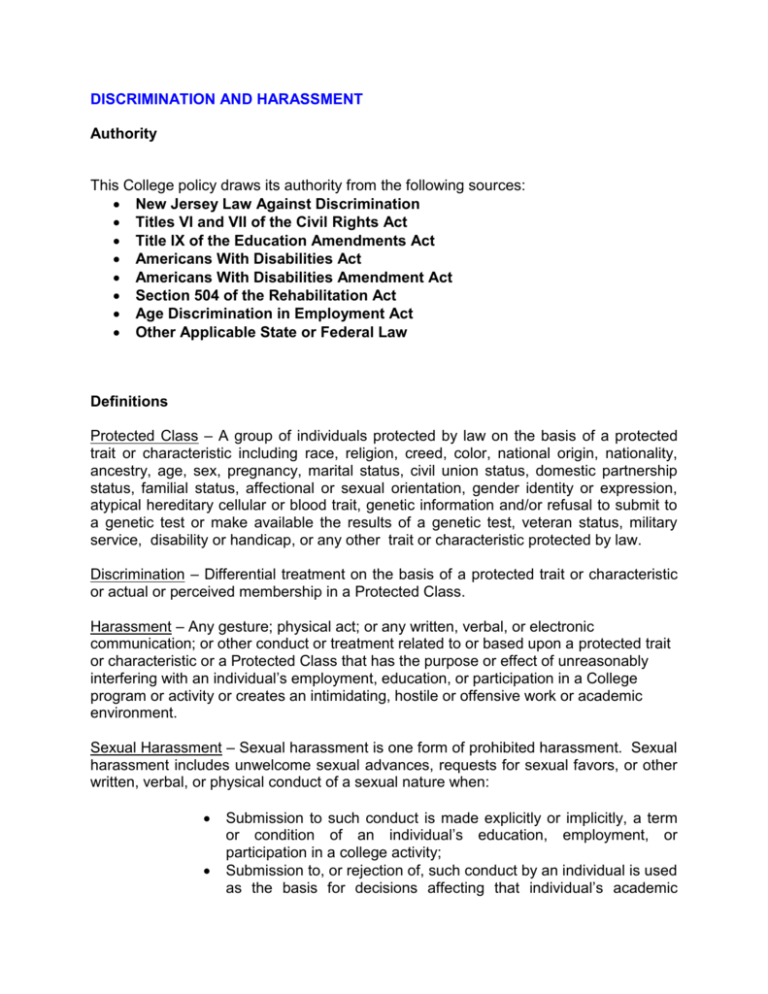
DISCRIMINATION AND HARASSMENT Authority This College policy draws its authority from the following sources: New Jersey Law Against Discrimination Titles VI and VII of the Civil Rights Act Title IX of the Education Amendments Act Americans With Disabilities Act Americans With Disabilities Amendment Act Section 504 of the Rehabilitation Act Age Discrimination in Employment Act Other Applicable State or Federal Law Definitions Protected Class – A group of individuals protected by law on the basis of a protected trait or characteristic including race, religion, creed, color, national origin, nationality, ancestry, age, sex, pregnancy, marital status, civil union status, domestic partnership status, familial status, affectional or sexual orientation, gender identity or expression, atypical hereditary cellular or blood trait, genetic information and/or refusal to submit to a genetic test or make available the results of a genetic test, veteran status, military service, disability or handicap, or any other trait or characteristic protected by law. Discrimination – Differential treatment on the basis of a protected trait or characteristic or actual or perceived membership in a Protected Class. Harassment – Any gesture; physical act; or any written, verbal, or electronic communication; or other conduct or treatment related to or based upon a protected trait or characteristic or a Protected Class that has the purpose or effect of unreasonably interfering with an individual’s employment, education, or participation in a College program or activity or creates an intimidating, hostile or offensive work or academic environment. Sexual Harassment – Sexual harassment is one form of prohibited harassment. Sexual harassment includes unwelcome sexual advances, requests for sexual favors, or other written, verbal, or physical conduct of a sexual nature when: Submission to such conduct is made explicitly or implicitly, a term or condition of an individual’s education, employment, or participation in a college activity; Submission to, or rejection of, such conduct by an individual is used as the basis for decisions affecting that individual’s academic standing, employment status, or participation in a college activity; or Such conduct has the purpose or effect of unreasonably interfering with an individual’s employment, education, or participation in a college activity or creates an intimidating, hostile, or offensive work or academic environment. Examples of Sexual and Other Types of Harassment include, but are not limited to: Display of offensive or explicit material or objects Distributing offensive, obscene, or harassing messages or photos electronically (via e-mail, text, phone, or any other electronic media) Possession, review, or display of graphic/inappropriate reading or other material Comments (including compliments) referring to, relating to, or on account of a protected trait or characteristic or membership or perceived membership in a protected Class Epithets, slurs, jokes, teasing, or use of slang referring to, relating to, or on account of a protected trait or characteristic or membership or perceived membership in a Protected Class Demeaning references, nicknames, or slang based upon or referring to a protected trait or characteristic or membership or perceived membership in a Protected Class Practical jokes, pranks, or teasing relating to, referring to, or on account of a protected trait or characteristic or membership or perceived membership in a Protected Class Explicit sexual references or descriptions, sexual teasing, jokes, innuendo, etc. Suggestive, insulting, or obscene comments, gestures, sound, etc. Unwelcome, unnecessary, unwanted, or inappropriate physical or sexual contact Sexual propositions, or repeatedly asking out or otherwise pursuing a person who has indicated they are not interested Isolation or any other differential or threatening treatment Physical interference Extortion, threats, or intimidation Coerced or forced sexual activity Stalking, physical or sexual threats, or physical assault Retaliation – adverse or differential treatment of any individual as a result of having made a report or complaint or harassment, discrimination, or other violation of this policy or participation in or provision of information in connection with an investigation of a violation of this policy. Policy It is the policy of the College to promote and maintain a work and academic environment in which all members of the College Community are treated with dignity and respect. The College recognizes the human dignity of each member of the College Community and expects all employees and students to promote respect and dignity for others so that all employees and students are free to pursue their goals in an open environment, able to participate in the free exchange of ideas, and able to share equally in the benefits of the College’s employment opportunities and educational programs and activities. The College is committed to ensuring that all current and prospective employees and students are given equal opportunity and treatment and providing its students with an academic environment and its employees with a work environment free from discrimination and harassment. No student or employee shall be denied participation in, the benefits of, or be subjected to discrimination in any educational program or activity or in employment based upon membership or perceived membership in a protected class. Discrimination and harassment are strictly prohibited on the College campus and at any other location where the College offers programs or activities or sponsors events. Discrimination and harassment are also prohibited in connection with College programs, activities, and events and in terms and conditions of employment. Harassment or discrimination through social media or other electronic communication is also prohibited. This prohibition against discrimination and harassment applies to all students, prospective students, employees, and prospective employees of the College, including student workers, and to all consultants, contractors, and other individuals performing work for the College. Reporting Discrimination or Harassment Potential violations of this policy must be reported immediately to Nancy Moore, Vice President for Human Resources and Labor Relations, (908) 526-1200 X8345, Raritan Valley Community College, Somerville, NJ 08876, nmoore@raritanval.edu or to John Trojan, the Vice President of Finance, (908) 526-1200 X8203, Raritan Valley Community College, Somerville, NJ 08876, jtrojan@raritanval.edu. An individual does not have to be the direct target of the discrimination or harassment to report it. Any faculty member, manager, supervisor, or administrator who observes, receives a report of, or otherwise becomes aware of potential or actual harassment or discrimination or any potential violation of this Policy, shall immediately report it to the Vice President of Human Resources or the Vice President of Finance. Failure to make such report will subject the manager, supervisor, or administrator to disciplinary action, up to and including termination. Upon receipt of a report under this Policy, a prompt, thorough, and impartial investigation will be conducted. The College is committed to handling reports of discrimination and harassment swiftly, fairly, and with sensitivity. Upon completion of the investigation, the College will take corrective action, as appropriate and consistent with the results of the investigation. To the maximum extent feasible, the privacy of all persons involved will be respected during the course of any investigation. However, an adequate investigation of any report under this Policy will generally require disclosure to the accused party and other witnesses in order to conduct a meaningful investigation. All members of the College community are expected to cooperate with any investigation arising from alleged violations of this policy. Retaliation against any individual reporting apparent violations of this policy and/or participating in an investigation is also strictly prohibited. Retaliation must be reported and will be investigated and corrected in the same fashion as other violations of this policy. Students found to be in violation of this policy are subject to disciplinary penalties, under the Student Code of Conduct, up to and including expulsion from the College. Employees found to be in violation of this policy are subject to disciplinary penalties, up to and including termination of employment. Questions regarding this Policy should be directed to the Vice President of Human Resources and/or the Vice President of Finance. Professional Demeanor and Interaction Employees and students are expected to interact professionally and treat each other with the dignity and respect expected of mature adults in a professional setting. Unprofessional, disrespectful, undignified, or inappropriate conduct or communications will not be tolerated irrespective of whether such conduct otherwise violates this Policy. Responsible Administrator – Vice President for Human Resources and Labor Relations Cross Reference – Student Harassment, Intimidation, and Bullying Policy Revised and reaffirmed 8.7 (October 29, 2002) 8.3 (October 29,2002) policies combined 8.7 (may 21, 2013) Communication – This policy is communicated to the College community in the following documents: College Catalog Faculty Handbook Student Handbook College Website Employment Documentation S:\CML\Raritan Valley Community College\Final Policies Proposed to Exec Comm 5.9.13\REVISED 4 6 12 RVCC PROPOSED DISCRIMINATION AND HARASSMENT POLICY.docx



